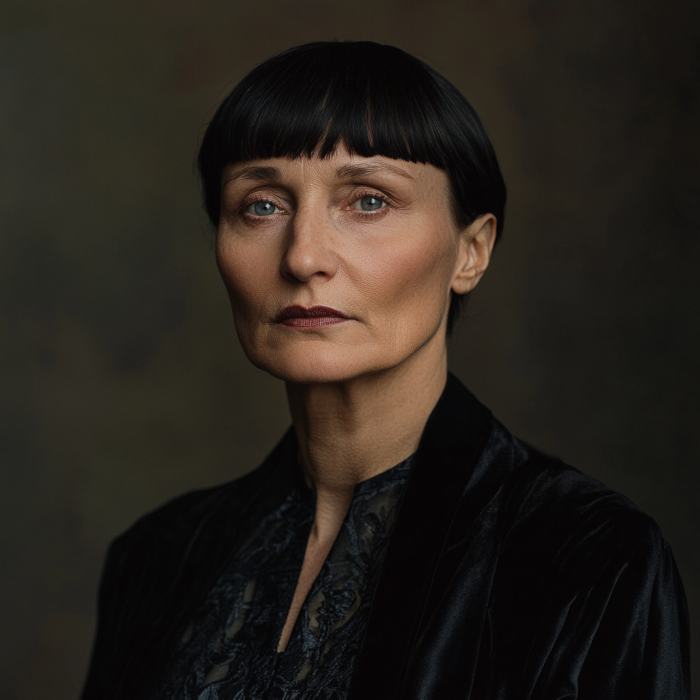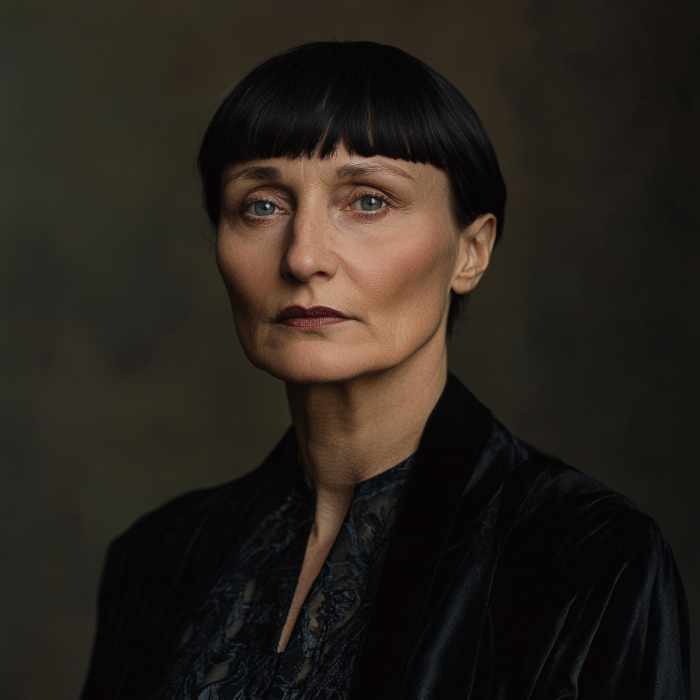


Anna Akhmatova (1889–1966), born Anna Andreyevna Gorenko, was one of Russia's most significant and beloved poets, known for her profound lyrical poetry, which often explores themes of love, loss, and the trauma of war and political repression. Her work spanned the tumultuous periods of the Russian Revolution, Stalin’s Great Purge, and World War II, making her both a witness to and a chronicler of some of the most difficult moments in Russian history. Despite censorship and political persecution, Akhmatova’s poetry has endured as a powerful testament to the resilience of the human spirit and the complexities of life in 20th-century Russia.
Birth and Family Background: Anna Akhmatova was born on June 23, 1889, near Odessa in the Russian Empire (now Ukraine). Her father, Andrey Gorenko, was a naval engineer, and her mother, Inna Stogova, came from a noble family. Akhmatova grew up in a well-to-do household but experienced the separation of her parents at a young age. Her father discouraged her from writing under her own name, fearing it would disgrace the family, so she adopted the pen name Akhmatova, derived from one of her maternal ancestors, a Tatar noble family.
Education: Akhmatova began writing poetry as a child and developed a deep love for literature. She studied at the Tsarskoye Selo Gymnasium near St. Petersburg and later attended courses at the Kyiv Institute for Women. Akhmatova was heavily influenced by the literary and cultural environment of St. Petersburg, particularly the works of Russian poets like Alexander Pushkin and the French Symbolists.
Acmeism and the Poetic Circle: In the early 1910s, Akhmatova became associated with the literary movement known as Acmeism, which emphasized clarity, precision, and directness in poetry, as opposed to the vagueness and mysticism of the Symbolist movement that preceded it. Acmeism sought to return poetry to its classical roots while exploring universal human experiences. Akhmatova, along with poets such as Nikolai Gumilev (her first husband) and Osip Mandelstam, was a central figure in this movement.
First Collection: Evening (1912): Akhmatova’s first poetry collection, Evening (1912), was well received and established her as a major voice in Russian literature. Her poetry was known for its lyrical intensity, focus on personal emotions, and exploration of themes such as love, betrayal, and longing. The imagery of her early work often drew from everyday life, with a distinctive, conversational tone that set her apart from her contemporaries.
Poetry of Love and Loss: Akhmatova’s early poetry, particularly collections like Rosary (1914) and The White Flock (1917), focused on the intimate and personal, especially the complexities of love, relationships, and the pain of separation. Her poems, often brief and tightly constructed, spoke to the inner lives of women, exploring their emotional landscapes in a way that resonated with a broad audience.
Impact of the Russian Revolution: The Russian Revolution of 1917 and the subsequent civil war drastically changed Akhmatova’s life and the course of Russian history. Her husband, Nikolai Gumilev, was arrested and executed by the Bolsheviks in 1921 for alleged counter-revolutionary activities, leaving Akhmatova a widow and politically suspect. Despite this, she chose to remain in Soviet Russia, even as many of her contemporaries fled into exile.
Censorship and Silencing: During the 1920s and 1930s, Akhmatova’s work fell out of favor with the Soviet authorities, who viewed her poetry as bourgeois and counter to the ideals of the revolution. She was banned from publishing for much of the 1920s, and her works were removed from Soviet literary anthologies. This period of forced silence, known as her "years of oblivion," saw her struggle with poverty and isolation. However, Akhmatova continued to write, even though much of her work remained unpublished or circulated only in private.
Persecution of Loved Ones: The Stalinist purges of the 1930s further devastated Akhmatova’s life. Her son, Lev Gumilev, was arrested multiple times and spent many years in labor camps. Akhmatova herself was subjected to constant surveillance and interrogation by the secret police. Her close friend and fellow poet, Osip Mandelstam, was also arrested and died in the Gulag. The personal toll of these years had a profound influence on her poetry, which increasingly addressed themes of suffering, repression, and survival.
Requiem (1935–1940): One of Akhmatova’s most famous and powerful works is Requiem, a poetic cycle written between 1935 and 1940 that memorializes the suffering of Soviet citizens during the Great Purge. The poem, which reflects her personal grief over the arrest of her son and the broader agony of the Stalinist terror, was not published in the Soviet Union until after her death due to censorship. In Requiem, Akhmatova speaks not only for herself but for the millions of women who waited outside prisons for news of their loved ones, capturing the collective trauma of the time.
Requiem is notable for its stark, unflinching portrayal of loss and despair. It is written in a simple, direct style, reflecting the universality of suffering during the purges. The cycle remains one of the most important literary works to emerge from the Soviet Union’s darkest period.
World War II and Poem Without a Hero: During World War II, Akhmatova lived through the Siege of Leningrad, one of the most devastating events of the war, during which hundreds of thousands of people died from starvation and bombing. In this context, Akhmatova wrote Poem Without a Hero, an epic, complex work that reflects on the cultural and historical losses suffered during both the Revolution and the war. Poem Without a Hero is one of Akhmatova’s most intricate and ambitious works, blending history, memory, and myth in a meditation on the cost of violence and the passage of time.
Post-Stalin Thaw: After Joseph Stalin's death in 1953 and the subsequent political thaw under Nikita Khrushchev, Akhmatova's work slowly began to be rehabilitated. She was allowed to publish again, and in the 1950s and 1960s, she became an icon of Russian culture. In 1964, she was awarded the Etna-Taormina International Prize for Poetry, and in 1965, Oxford University granted her an honorary doctorate, marking international recognition of her work.
Late Poems and Influence: Akhmatova’s later poems continued to reflect her personal experiences and the history she had witnessed. Her style remained rooted in the lyrical tradition, characterized by restraint and emotional depth. Her poetry had a profound influence on subsequent generations of Russian poets, particularly in how it demonstrated the power of poetry to bear witness to historical events and personal suffering.
Death and Posthumous Recognition: Anna Akhmatova died on March 5, 1966, in Domodedovo, near Moscow, after years of illness. She left behind a legacy as one of the most significant literary figures of the 20th century. Much of her work that had been censored or suppressed during her lifetime was published posthumously, solidifying her place in the canon of world literature.
Lyrical Intensity: Akhmatova’s poetry is known for its emotional intensity, particularly in exploring themes of love, longing, and loss. Her poems are often concise, with a focus on personal experience, yet they resonate with universal themes of suffering and endurance.
Historical Witness: While much of Akhmatova’s early work focused on personal emotions, her later poetry increasingly reflected the political and historical turmoil of 20th-century Russia. Her poems became a voice for those who lived through the horrors of Stalinism, World War II, and the broader societal upheavals of the era.
Symbolism and Imagery: Though associated with the Acmeist movement, which emphasized clarity and directness, Akhmatova’s work is also rich with symbolism. She frequently used imagery drawn from Russian folklore, Christian symbolism, and classical mythology to convey deeper emotional and spiritual truths.
Anna Akhmatova’s poetry stands as a testament to the power of art to endure even in the face of extreme adversity. Her work captured the pain and suffering of individuals living through some of the darkest periods of Russian history, while also expressing deeply personal emotions of love, loss, and resilience. Despite censorship, personal persecution, and the loss of many of her loved ones, Akhmatova remained committed to her craft, producing poetry that has left a lasting impact on Russian literature and world culture. Today, she is remembered as one of the greatest poets of the 20th century, a voice of conscience, and a chronicler of both the personal and the political in times of crisis.

We use cookies
We use cookies and other tracking technologies to improve your browsing experience on our website, to show you personalized content and targeted ads, to analyze our website traffic, and to understand where our visitors are coming from. Privacy Policy.